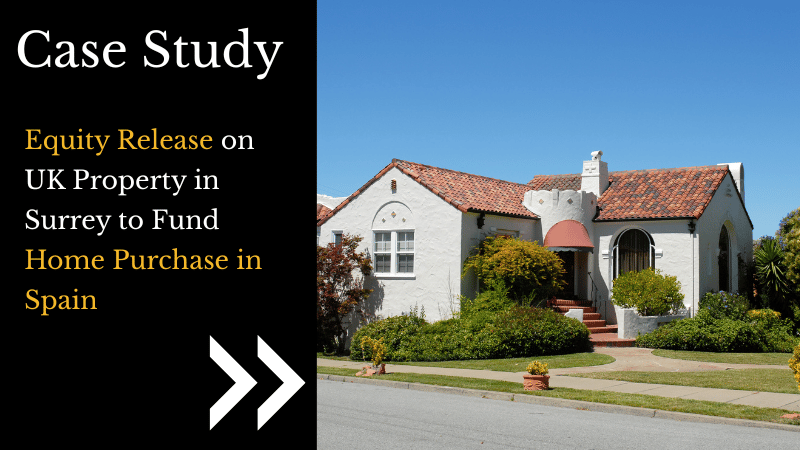Categories
Aged 70 Plus? How to Get a Mortgage

The mortgage landscape for retirees may not look quite the same as it does for people in their 20s, 30s, and 40s, but that doesn’t mean financial solutions for people in their 70s are limited.
At Clifton Private Finance, we’re here to help you navigate the over 70s mortgage arena, giving you the information you need to evaluate the options and make an informed decision that meets your needs. Join us as we explore the ways you can make your home equity work for you.
Check Your Eligibility
Reasons for a Mortgage at 70+
Let’s be honest - it’s unlikely that you’re looking at your first home purchase mortgage in your retirement years. What’s far more likely is that you own your home but you’re looking to improve your day-to-day funds and savings.
Many people in their 70s and beyond are ’asset rich, cash poor’, a term that suggests you’ve spent your life pouring your money into your home, only to find yourself in a later-life situation where you’re no longer working and having to cut back.
Thankfully, that money tied up in your home doesn’t have to remain locked. With a mortgage, you can unlock that capital without losing any of the security of a home for life.
There are plenty of reasons you might like to do exactly that:
- Improving your retirement - If you are feeling the pinch in your retirement years, then releasing some of the money held in your home will give you the support you need to relax with a little more comfort.
- Refinancing - You might have taken out an interest-only mortgage decades ago, with a plan to sell your home for profit or a reliance on an endowment policy, but shifting markets and life changes now make those plans unsuitable. Refinancing can give you the power to keep your home without worry.
- Downsizing - Perhaps your family home is now too big, with unused rooms and family long flown from the nest. Downsizing means you can move to a more suitable property that’s closer to your loved ones or in a spot you’ve always dreamed of.
- Helping family - Unlocking your capital doesn’t have to be just for personal use. Helping your children or grandchildren get on the property ladder, or seeing younger family through university are common reasons to seek a later-life mortgage.
- Debt consolidation - If you’re struggling under the weight of high-interest debts, such as credit cards, your home equity can be used to bring it all under control.
- Home improvements - Modernising your home brings many advantages, improving your comfort or making adaptations for accessibility. Using the money held in your house to refurbish has a lovely sense of appropriateness to it.
- Splashing out - You may be looking at the holiday of a lifetime or buying that certain something you’ve always had your eye on. There’s no need to go without when you’re sitting on the money needed to make those dreams become reality.
- Paying for care - Being comfortable in your older age with the right level of care can be expensive. The equity that you’ve spent years building up in your home is there to make sure you get the care you deserve.
6 Options for Over 70s Mortgages
A mortgage is a loan, and like any other loan, it does need to be repaid. Retirement and lifetime mortgages are structured to make this repayment as flexible and unobtrusive as possible, letting you relax in your retirement years without worrying.
This is done by structuring the mortgage so it is only repaid when you don’t need the house anymore, with the balance repaid in full when the property is sold. This may be because:
- You decide to sell up and move on - This could be because you are downsizing, moving to a retirement home, or moving in with family. In some cases, and depending on the property you move to, it may be possible to continue with your mortgage arrangement.
- You move into full-time care - When the homeowner leaves for full-time care, most lifetime mortgage arrangements will require the sale of property to repay the loan.
- You pass away - Lifetime mortgages are repaid by the estate upon the homeowner’s death.
Because the mortgage is repaid in full when the property is sold, there is no need for a monthly repayment schedule - although many retirement mortgages have the flexibility for you to repay the interest over time to minimise costs.
The different types of over 70s mortgages include:

Lifetime mortgages
The standard equity release package, a lifetime mortgage provides a lump sum of capital with no monthly repayments. It is repaid in full, with all interest, as described above.

Drawdown mortgages
Very similar to a standard lifetime mortgage, drawdown mortgages release the equity in stages when needed, rather than a single lump sum. This results in less interest being accrued over the term which can be preferable if you don’t need all the money at once.

Home equity line of credit (HELOC)
A HELOC mortgage is a flexible option, allowing you to draw against your home equity, rather like a credit card where the lifetime mortgage represents the credit limit.
With flexible repayment options, a HELOC can greatly reduce the interest on the mortgage, while providing funds when needed. HELOCs are a specialist lifetime mortgage option in the UK offered by only a few lenders, though the market for this powerful and flexible option is growing.

Retirement interest-only mortgages (RIO)
A RIO mortgage has set monthly payments to cover the interest on the mortgage, similar to a standard interest-only mortgage. When the repayments are no longer manageable, or after a defined term, a some RIO mortgages have the option to convert to a standard lifetime mortgage - see Payment Term Lifetime Mortgages.
RIOs are especially useful for refinancing an existing mortgage or purchasing new property, such as when downsizing.

Bridging finance
Though not a true mortgage, bridging finance offers a short-term solution when timing is essential. This may be to pay for care fees in an emergency, to take advantage of a sudden opportunity (such as an auction property), or to break a property chain when downsizing.
Bridging finance options can be discussed with our specialist bridging finance team. To learn more, read our comprehensive Guide to Bridging Loans.
Think bridging finance might be right for you?
Get started with our calculator

Home reversion plans
A home reversion plan is not a mortgage, but involves you selling a percentage of your house to a third party while you remain resident.
In most cases, a home reversion plan is inferior and more costly than a standard lifetime mortgage. Speak to a Clifton Private Finance advisor to learn more about the pros and cons of a home reversion plan, or look to our knowledge base for more information.
Did You Know?
Because high street banks have strict age caps on their mortgage products, borrowing options shrink dramatically after age 70+. However, we now have access to a new defined term interest-only mortgage designed specifically for older borrowers, with options available well into your 80s.
Key features include:
- Borrow up to age 85 (higher for joint applications)
- Flexible income assessment – pensions, rental, part-time work, etc.
- Borrow more than with standard lenders (often 6× income+)
- Available for refinancing, debt consolidation, helping family, etc.
- Very competitive rates compared to similar later-life products
- Up to 75% LTV (in some cases 80%)
- Fast approval times with pre-eligibility checks before application
Call us today or book a free consultation to see how much you could borrow and to get advice on whether this could be the right fit for you compared to other later life mortgages, and to learn more, read our guide to interest only mortgages over 70 .
Support from Experts
Getting help from experts, like our dedicated retirement mortgages team at Clifton Private Finance, makes all the difference.
Specialist advice and dedicated independent legal support is part of the process.
Clifton Private Finance and our partners work with the full marketplace of UK lenders to bring you a lifetime mortgage that is tailored to your individual requirements.
An advisor will work hand-in-hand with you throughout the process to make sure that you’re getting the right product for your needs, and that everything is as smooth as possible.
This means:
- Full consultation - We listen to your plans, thoughts, and worries, making sure to answer every question you have to your satisfaction.
- Comparison and evaluation - We don’t just pass you to the first lender on the list, but scour the full market on UK specialist lenders to find one who works for you. That means getting a better rate, paying less interest, and having the maximum amount of flexibility to meet your exact requirements.
- Application processing - Working with you, we will help develop your application to make the process as smooth as possible. At each stage, our advisors are on hand to help you get the right paperwork in place.
- Working with your solicitors - It’s essential that you get outside independent advice, so we take a short step back while you engage with your legal representation. However, we are here throughout to answer any questions and ensure the process is undertaken with efficiency.
- Finalising the loan - When it comes to releasing the money, we’re here to make sure everything goes as smoothly as possible.
- Ongoing support - Your peace of mind and our continued relationship is important to us. We’re always here to help in the future, no matter what might arise.
Choosing Clifton Private Finance means working with seasoned experts who put your needs first.
Over 70s Mortgages - Frequently Asked Questions
Q: Can I get a standard residential mortgage over 70?
A: It’s rare, but it might be possible. Lenders will undertake strict affordability testing to make sure you can make regular monthly repayments. If your pension or other income meets these criteria, then it is possible to buy a new house with a residential mortgage even at 70, though the length of the mortgage will be shorter than a typical 25-year term. Speak to a specialist advisor to discuss your specific requirements.
Q: Can I invest in property to rent out aged 70?
A: Yes. You can release equity in your current home and use it to buy another property that can then be let out. This could be by buying a smaller property outright, or utilising a RIO mortgage to achieve something slightly larger. If the expected rental yield on the new property is strong, we can help. Speak to one of the dedicated mortgage team at Clifton Private Finance today.
Q: Can I get a mortgage to buy property for my family?
A: Yes. You can release equity in your home and then gift that to your family member for their use as a deposit or even a full payment on a home. Speak to a Clifton Private Finance advisor to find out how much buying power your home could offer.
Q: How much money can I unlock from my home?
A: Many lenders will provide loans of 40% loan-to-value (LTV) or greater as a standard lifetime mortgage on your home. This will increase as you get older, with those 80+ regularly offered 50% LTV. At Clifton Private Finance, our advisors can seek out the best deals with the highest LTV possible. For reference, a property valued at £500,000 would release £200,000 at 40% LTV, and £250,000 at 50% LTV.
Q: Can I get equity release if I still have a current mortgage?
A: Yes. In most circumstances, the equity release will pay off the existing mortgage as part of the refinancing of the property. In specialist situations, a second-charge equity release that leaves the existing mortgage untouched may be possible. Discuss your specific requirements with one of our specialists at Clifton Private Finance.
Q: How does equity release affect my family’s inheritance?
A: As the equity release and all interest accrued is paid upon your passing, the home will have to be sold to cover the debt. Any additional proceeds from the sale will then be added to the estate that is passed to your family. Discussing equity release with your family before going ahead is recommended. To learn more about how equity release impacts your family’s inheritance and how ring-fencing can help, look to our article How Does Equity Release Work When You Die?
Q: How much interest will I have to pay with a lifetime mortgage?
A: Interest rates on lifetime mortgages will fluctuate depending on your circumstances, with current rates (June 2025) between 5.9% and 8%. In realistic terms, this approximates a doubling of the balance every 10 to 12 years. However, it should also be noted that property value also increases - often at a faster rate, with many properties in the UK having tripled in value over the past 15 years. This balance keeps lifetime mortgage interest in check. Further savings can be made by choosing a flexible mortgage structure, such as a RIO that allows for interest to be repaid during the term, or a drawdown mortgage that minimises interest by taking the capital in stages as it is needed.
Q: What is a ‘no negative equity guarantee’?
A: The no negative equity guarantee is a ruling all regulated lenders adhere to, which states that the size of the loan, plus all interest, cannot exceed the market value of the home. This ensures that even if your home drops in value, it will be able to cover the full balance of the mortgage debt when sold.
Q: What if my property loses value over the years?
A: You are expected to keep your home in a good condition during the years of the lifetime mortgage, however, it is understood that property may lose value. The no negative equity guarantee is in place to protect you and your heirs, while other systems, such as ring-fencing, can offer additional protection. Full building insurance is also a requirement for any equity release mortgage.
Over 70s Mortgages with Clifton Private Finance
If you are looking to make the most out of the money locked in your home, speak to a Clifton Private Finance specialist today - we’ll help you boost your retirement with the cash you’ve been silently saving this whole time.











